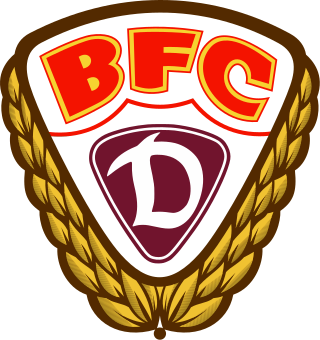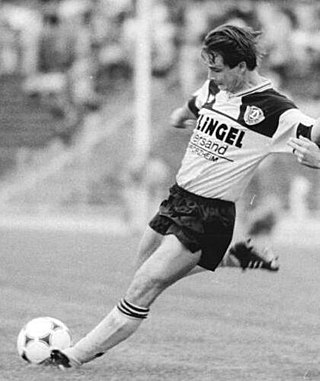
Sportgemeinschaft Dynamo Dresden e.V., commonly known as SG Dynamo Dresden or Dynamo Dresden, is a German association football club based in Dresden, Saxony. They were founded on 12 April 1953 as a club affiliated with the East German police and became one of the most popular and successful clubs in East German football, winning eight league titles.

Berliner Fussball Club Dynamo e. V., commonly abbreviated to BFC Dynamo or BFC, alternatively sometimes called Dynamo Berlin, is a German football club based in the locality of Alt-Hohenschönhausen of the borough of Lichtenberg of Berlin. BFC Dynamo was founded in 1966 from the football department of SC Dynamo Berlin and became one of the most successful clubs in East German football. The club is the record champion of East Germany with ten consecutive league championships from 1979 through 1988. BFC Dynamo competes in the fourth tier Regionalliga Nordost. The club enjoys a cross-city rivalry with 1. FC Union Berlin and a historical rivalry with SG Dynamo Dresden. The rivalry with Union Berlin is part of the Berlin derby.

Dresdner Sportclub 1898 e.V., known simply as Dresdner SC, is a German multisport club playing in Dresden, Saxony. Founded on 30 April 1898, the club was a founding member of the German Football Association in 1900. The origins of the club go back still further to the predecessor side Dresden English Football Club formed in 1874 by expatriate Englishmen as Germany's first football club and possibly the earliest in continental Europe: Dresdener SC was organized by one-time German members of the EFC.

The Deutscher Fußball-Club Prag, commonly known as DFC Prag, was a football club based in Prague. The club was founded on 25 May 1896 by a group of German Jews in Prague, which at the time of its founding was the capital of the Kingdom of Bohemia in Austria-Hungary. DFC Prag was one of the strongest teams in Europe in the beginning of the 1900s. The team took part in the 1903 German football championship final and became Bohemian champions several times. The club was dissolved in 1939, following the occupation of Czechoslovakia by Nazi Germany. A new DFC Prag was founded on 9 June 2016, in the tradition of the original club.

Norbert Trieloff is a German former football player.
The 1984–85 DDR-Oberliga was the 36th season of the DDR-Oberliga, the first tier of league football in East Germany.
Football club was a designation for a specially promoted club for elite football in East Germany. The football clubs were formed during the winter break 1965-1966 as centers of excellence in East German football. The football clubs enjoyed considerable advantages over other sports communities in East German football. In addition to the ten designated football clubs, SG Dynamo Dresden was also promoted in a similar way to the dedicated football clubs from 1968.

Jörg Stübner was a German professional footballer who amassed 47 international caps for East Germany.

RasenBallsport Leipzig e.V., commonly known as RB Leipzig, Red Bull Leipzig, or simply Leipzig, is a German professional football club based in Leipzig, Saxony. The club was founded in 2009 by the initiative of the company Red Bull GmbH, which purchased the playing rights of fifth-tier side SSV Markranstädt with the intent of advancing the new club to the top-flight Bundesliga within eight years. The men's professional football club is run by the spin-off organization RasenBallsport Leipzig GmbH. RB Leipzig plays its home matches at the Red Bull Arena. The club nickname is Die Roten Bullen.

Rudolf-Harbig-Stadion is a football stadium in Dresden, Saxony. It is named after German athlete Rudolf Harbig, and is the current home of Dynamo Dresden. Sports facilities have existed on the site of the stadium, the Güntzwiesen, since 1874. On 10 September 1911 the stadium hosted an international friendly match between Germany and Austria, which ended in a 1:2 defeat of host team Germany. The stadium also hosts events other than soccer games and has hosted several home games of the Dresden Monarchs American Football team of the German Football League, including their lone home appearance in the BIG6 European Football League in 2014.
Friedrich August Wilhelm Theodor Hermann was a German physical education instructor. He, along with Konrad Koch, introduced the game of association football to Germany from England in 1874. He is known as the Braunschweig "Father of Physical Education." Hermann also wrote and published poetry in the Low German language.

Wilhelm Carl Johann Conrad Koch, commonly known as Konrad Koch was a German teacher and football pioneer.
Association football club RB Leipzig-affiliated teams include a reserve team, women's team, and junior and academy teams.
Auguste Hohenschild was a German alto and singing teacher. She was trained by Amalie Joachim and performed together with Marie Fillunger, among others. From 1893 to 1922, she was married to Andreas Heusler, a German scholar, and lived in Berlin for several years.

Helena Forti was a dramatic soprano active 1906 – 1924, closely associated with the Dresden royal court opera, known for her beauty, voice and strong stage presence. She sang all Wagner's opera heroines, in Dresden, Bayreuth and internationally. Other repertoire included the title role in Verdi's Aida, Santuzza in Mascagni's Cavalleria and contemporary works such as Marietta in Korngold's Die tote Stadt. She created the role of Myrtocle in d'Albert's Die toten Augen. Her Sieglinde in Die Walküre in Braunschweig was described by the Neue Zeitschrift für Musik as "Equally endowed with youth, beauty and vocal means... (Forti) immerses herself so intensely in her role that one believes the transformation of the virgin-Goddess into a human form." After retiring from the stage she taught voice and acting in Gera, Düsseldorf and Vienna. She died in Vienna, where she lived with her stage director and Intendant husband, Walter Bruno Iltz.
George Washington Pittrich was a German composer and Kapellmeister.
The history of BFC Dynamo began with the founding of the sports club Dynamo Berlin in 1954. SC Dynamo Berlin entered the 1954–55 DDR-Oberliga after taking over the first team of SG Dynamo Dresden and its place in the league. The relocation was designed to provide the East German capital with a competitive team that could rival the teams from West Berlin. Prominent players in the team were Günter Schröter, Johannes Matzen, and Herbert Schoen. Dynamo Berlin captured its first trophy in the 1959 FDGB-Pokal. The team then finished the 1960 DDR-Oberliga as runner-up. However, the team was relatively weak in the 1960s and was overshadowed in the capital by ASK Vorwärts Berlin.










